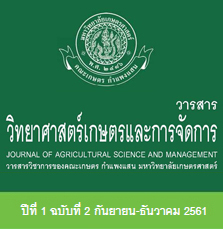Upland Rice and Food Security of Highland Ethnic Groups in Chiang Mai
Keywords:
Upland rice, food security, ethnic groupsAbstract
This research aimed to study food security of ethnic groups and to propose guidelines for the creation of ethnicity food security for the people in Chiang Mai. The sample was 41 villages who were responsible for their families’ food. Data were collected by the completion of interview questionnaires and analyzed by descriptive statistics. The results showed that the sample population needs yield of rice about 103 tons paddy/year to be sufficient for consumption. The problem could be solved by: 1) increasing yield of upland rice 2) changing to rice of terrace paddy cultivation and 3) moving rice from flat to highland areas. Consideration should be given to the mix of options, depending on which option was appropriated to the area and status of the ethnic groups in the area. It should also consider the impact on the highland environment on the concept of rehabilitation and conservation of forest resources
References
กลุ่มศูนย์วิจัยข้าวภาคเหนือตอนบน. 2553. เทคโนโลยีการทำนาขั้นบันไดบนพื้นที่สูง. สำนักวิจัยและพัฒนาข้าว กรมการข้าว, กรุงเทพฯ. 82 หน้า.
ชัยฤทธิ์ ดำรงเกียรติ์. 2555. ข้าวไร่กับการสร้างความมั่นคงทางอาหารบนพื้นที่สูง. หน้า 1-28. ใน: รายงานการประชุมวิชาการข้าวแห่งชาติ ครั้งที่ 2. โรงแรมสวิสโซเทล เลอ คองคอร์ด, กรุงเทพฯ.
ถาวร กัมพลกูล. 2547. ไร่หมุนเวียนในวงจรชีวิตชนเผ่าปกาเกอะญอ. บี.เอส.ดี. การพิมพ์, เชียงใหม่. 223 หน้า.
พิชัย สุรพรไพบูลย์ พิกุล สุรพรไพบูลย์ สุนทร มีพอ และ สริตา ปิ่นมณี. 2558. การทดสอบผลผลิตพันธุ์ข้าวไร่ในพื้นที่โครงการขยายผลโครงการหลวงแม่จริม จังหวัดน่าน. วารสารวิทยาศาสตร์และเทคโนโลยี 23(5): 817-824.
ศูนย์อุตุนิยมวิทยาภาคเหนือ. 2561. รายงานสภาพอากาศทั่วไป. (ระบบออนไลน์). แหล่งข้อมูล: http://www.cmmet.tmd.go.th/index1.php (25 พฤศจิกายน 2561).
สถาบันวิจัยเพื่อการพัฒนาประเทศไทย. 2561. แนวโน้มคนไทยบริโภคข้าวลดลง. (ระบบออนไลน์). แหล่งข้อมูล: http://www.apecthai.org/index.php/จับกระแสเศรษฐกิจ-2558/11774-แนวโน้มคนไทยบริโภคข้าวลดลง.html (25 พฤศจิกายน 2561).
สถาบันวิจัยและพัฒนาพื้นที่สูง (องค์การมหาชน). 2561. ข้อมูลสารสนเทศภูมิศาสตร์ (GIS). (ระบบออนไลน์). แหล่งข้อมูล: http://gis.hrdi.or.th/index.php (25 พฤศจิกายน 2561).
สำนักวิจัยและพัฒนาข้าว. 2555. เทคโนโลยีการปลูกข้าวไร่อย่างยั่งยืน. โรงพิมพ์ชุมนุมสหกรณ์การเกษตรแห่งประเทศไทย จำกัด, กรุงเทพฯ. 116 หน้า.
อนันท์ กาญจนพันธุ์ ปิ่นแก้ว เหลืองอร่ามศรี ทวิช จตุวรพฤกษ์ ไพบูลย์ เฮงสุวรรณ์ อัจฉรา รักยุติธรรม วิเชียร อันประเสริฐ สกุณี ณัฐพูลวัฒน์ มณฑล จำเริญพฤกษ์ พสุธา สุนทรห้าว และ สุรินทร์ อ้นพรม. 2547. ระบบการเกษตรแบบไร่หมุนเวียน: สถานภาพและการเปลี่ยนแปลง. คณะสังคมศาสตร์ มหาวิทยาลัยเชียงใหม่, เชียงใหม่. 334 หน้า.
Best, J. W. 1977. Research in Education. 3rd ed. Englewood Cliffs, New Jersey. 384 p.
Yamane, T. 1973. Statistics an Introduction Analysis. 3rd Edition. Harper & Row Publishers, Inc., New York. 400 p.






